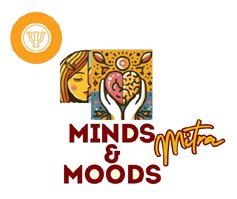Top Parent-Child Counselling Services
Parent-child counselling is a powerful and compassionate form of psychotherapy designed to strengthen emotional bonds between parents and children. It aims to resolve behavioral conflicts, communication barriers, emotional distress, and developmental challenges that often arise within families. Through expert guidance from a skilled mental health counsellor or psychologist, families learn to build trust, empathy, and healthier communication patterns. Parenting support counselling also provides tools for emotional regulation, behavior management, and mutual understanding between parent and child.
About RRIMI BODALKAR
RRIMI BODALKAR is a Senior Psychotherapist and Mental Health Counsellor based in Nagpur, holding an M.A. in Psychology (Counselling) and PGDMH (Clinical). She is NSDC Certified in Psychometric Analysis and Learning Style Assessment, and specializes in CBT, REBT, and DBT. With vast experience in relationship counselling, child psychology, anger management counselling, and personality development counselling, she provides holistic therapy for children, parents, and families. Her compassionate and evidence-based approach blends modern psychology with emotional wisdom, making her one of the most respected psychotherapists and counsellors in Nagpur, known for transforming family dynamics and nurturing mental wellness.
Understanding Parent-Child Counselling
Parent-child counselling focuses on identifying emotional triggers, communication gaps, and relational imbalances within the family. It is commonly sought at reputed counselling centers by families facing issues such as academic stress, defiance, withdrawal, or excessive emotional dependency. A professional child psychologist or family therapist uses evidence-based methods like Cognitive Behavioral Therapy (CBT), Rational Emotive Behavior Therapy (REBT), and Dialectical Behavior Therapy (DBT) to restore harmony and understanding.
Common Symptoms Indicating Need for Parent-Child Counselling
- Frequent arguments or communication breakdown between parent and child.
- Anger outbursts, emotional withdrawal, or defiance in children or adolescents.
- Behavioral changes like aggression, isolation, or anxiety.
- Decline in academic performance or lack of motivation, often needing academic stress psychology support.
- Emotional distance or lack of bonding due to busy work schedules or stress.
- Parental guilt or helplessness in managing teenage behavior, addressed through parenting support counselling.
- Signs of ADHD, Autism spectrum issues, or learning difficulties needing neuropsychological testing or psychometric assessment.
Possible Causes of Parent-Child Conflicts
- Unrealistic expectations from children regarding academics or behavior.
- Workplace stress in parents leading to reduced emotional availability.
- Peer pressure and comparison affecting children’s self-esteem.
- Negative thinking patterns or unaddressed trauma within family members.
- Communication barriers due to generational or cultural differences.
- Emotional distress after divorce, loss, or grief, which may require grief and loss counselling or personal counselling.
Therapeutic Procedure in Parent-Child Counselling
The process of parent-child counselling begins with an initial assessment by a psychologist or mental health counsellor. This may involve IQ testing, personality assessment, or psychometric evaluation to understand the emotional and cognitive profile of both parent and child.
The therapy plan is then customized based on identified challenges and emotional needs. Treatment approaches often include:
- Cognitive Behavioral Therapy (CBT): Helps replace negative thought patterns with constructive communication.
- Rational Emotive Behavior Therapy (REBT): Corrects irrational beliefs causing conflict or guilt.
- Dialectical Behavior Therapy (DBT): Enhances mindfulness, emotion regulation, and tolerance between family members.
- Behavioral therapy: Focuses on shaping desired child behavior through positive reinforcement.
- Social skills training: Builds empathy, patience, and listening skills among children and parents.
- Life transition counselling: Supports parents and children adjusting to new life stages or circumstances.
For children with special needs, support for special needs children programs are integrated with autism spectrum evaluation and ADHD testing to ensure holistic care. Parenting support counsellors also collaborate with school stress counselling experts to improve the child’s academic and social well-being.
Benefits of Parent-Child Counselling
- Improved communication and emotional bonding between parents and children.
- Enhanced empathy, understanding, and mutual respect in relationships.
- Reduced anger, anxiety, and negative thinking patterns.
- Better academic performance and focus through confidence building counselling.
- Support for behavioral and developmental disorders like ADHD or Autism.
- Effective anger management counselling and stress management strategies for both parents and children.
- Long-term emotional resilience through personality development counselling.
FAQ’s on Parent-Child Counselling
Q1: Who should seek parent-child counselling?
Families experiencing constant arguments, emotional disconnection, or behavioral issues in children should consider parent-child counselling with a professional psychotherapist or child psychologist.
Q2: What age group benefits from child counselling?
Children as young as 4 years can benefit from therapy. Child psychologists use creative methods like play therapy and behavioral therapy to connect with children emotionally and cognitively.
Q3: Can parent-child counselling help with teenage issues?
Yes. Teenagers struggling with identity, peer pressure, or academic stress benefit immensely from sessions focusing on self-expression and confidence building.
Q4: How long does the therapy last?
The duration varies, but consistent sessions over 2–3 months bring noticeable improvement in relationships and emotional understanding.
Q5: What if the child has ADHD or Autism?
For children diagnosed with ADHD or on the Autism spectrum, customized therapy plans include ADHD testing, autism spectrum evaluation, and neuropsychological testing under expert supervision.

